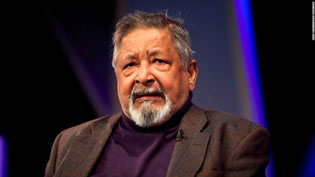Nobel Prize-winning novelist Sir Vidiadhar Surajprasad Naipaul, known for his A Bend in the River and his masterpiece, A House for Mr Biswas, breathed his last Saturday. He was 85.Naipaul was born to a family that had arrived in Trinidad from India in the 1880s. The masterful craftsman through his pithily condensed sentences and restrained flow of emotions lucidly painted his characters.
Bhubaneswar: Naipul’s Mohun Biswas in A House for Mr Biswas, Mr.Stone in Mr.Stone and the Knights Companion, Ralph Singh in Mimic Men and Willie Somerset Chandran in Half a Life to name a striking few, are recorded by the author in a detached and analytical manner making him a powerful exponent of the Third World reality. Naipaul published more than 30 works spanning both fiction and nonfiction. He was awarded the 1971 Booker Prize for his novel In a Free State and in 2001 won the Nobel Prize for Literature. His first book, The Mystic Masseur, was published in 1957.
Orissa POST interacted with some of the city littérateurs about Naipaul’s demise.
For poet Kshirod Parida Naipaul proudly flaunted his Indian roots. “Be it his Noble acceptance speech or his works, rarely did he miss an occasion to showcase his roots,” he said. Parida mentioned that Naipaul himself has said that his writings are influenced by his father who was a journalist.”
It may be worth mentioning here that most of Naipaul’s books have got Indian names or Indian smell on its titles for instance A house for Mr. Biswas, Parida pointed out. By passion a traveller, Naipaul penned down his travelogue The Middle Passage: Impressions of Five Societies – British, French and Dutch in the West Indies and South America in 1962. “His remarks on India may describe him as haughty but to be precise he was fearless,” Parida added. He lamented that when the entire world is looking at Indian writers for their “Indianness”, we lost a soldier who leaded from the front and ostentatiously displayed his roots.
Author Ramendra Kumar cited Naipaul’s A House for Mr Biswas as the latter’s best. “I think it was his masterpiece, his contribution to literature is immeasurable and ineffable. Although he was born in Trinidad, his roots are Indian and in his books he had talked about various aspects of India,” he said.
Novelist Pitabas Routray termed Naipaul “very analytical writer” and mourned his death saying, “The literary world has lost a great soul.”
Askhay Routray, who runs a bookstore, said, “We are remembering the great soul Naipaul by offering special discounts on his books.” Routray had just finished reading Naipaul’s ‘A Writer’s People: Ways of Looking and Feeling’ and said, “His (Naipaul’s) understanding of Mahatma Gandhi, Nirad Chaudhuri, Nehru and India is something which have never been penned down by any.” He added, “We lost a great storyteller but his stories will live in perpetuity.”
Known for his writings on colonialism and decolonisation, exile and the struggles in the developing world, Naipaul earned the rage of many for his books Among the Believers (1981) and Beyond Belief (1998).
Author Sailesh Mishra said, “For his many supporters, his fiction had merciless comic clarity and travel writing a terrifying honesty, refusing to glamorise or idealise the developing world.”
